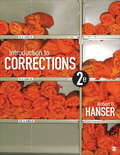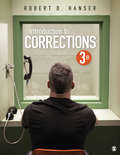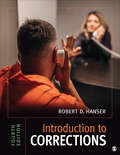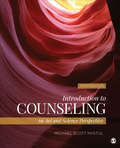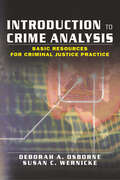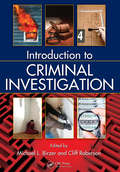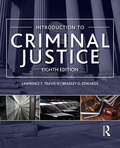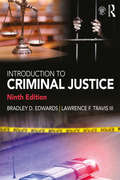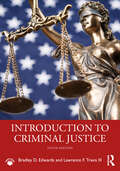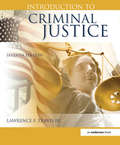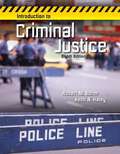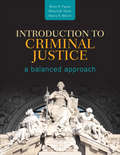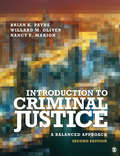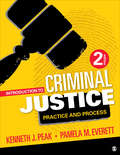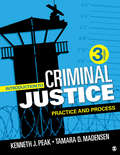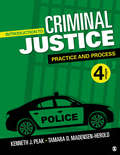- Table View
- List View
Introduction to Corrections
by Robert D. HanserThe Second Edition of Introduction to Corrections provides students with a strong, comprehensive foundation in the field of corrections using modern research, theoretical origins, and practical application. Designed for introductory corrections courses, this text uniquely illustrates how the day-to-day practitioner conducts business in the field of corrections, in both the institutional and community settings. Experienced correctional practitioner, scholar, and author, Robert D. Hanser shows students how the corrections system actually works, from classification, to security, to treatment, to demonstrating how and why correctional practices are implemented.
Introduction to Corrections
by Robert D. HanserThe Second Edition of Introduction to Corrections provides students with a strong, comprehensive foundation in the field of corrections using modern research, theoretical origins, and practical application. Designed for introductory corrections courses, this text uniquely illustrates how the day-to-day practitioner conducts business in the field of corrections, in both the institutional and community settings. Experienced correctional practitioner, scholar, and author, Robert D. Hanser shows students how the corrections system actually works, from classification, to security, to treatment, to demonstrating how and why correctional practices are implemented.
Introduction to Corrections
by Robert D. HanserIntroduction to Corrections provides a comprehensive foundation of corrections that is practitioner-driven and grounded in modern research and theoretical origins. This text uniquely illustrates how the day-to-day practitioner conducts business in the field of corrections in both institutional and community settings. Experienced correctional practitioner, scholar, and author Robert D. Hanser shows readers how the corrections system actually works, from classification, to security, to treatment, to demonstrating how and why correctional practices are implemented. Furthering the reality of the modern correctional experience, the Third Edition includes a new chapter on immigration detention centers.
Introduction to Corrections
by Robert D. HanserIntroduction to Corrections provides a comprehensive foundation of corrections that is practitioner-driven and grounded in modern research and theoretical origins. This text uniquely illustrates how the day-to-day practitioner conducts business in the field of corrections in both institutional and community settings. Experienced correctional practitioner, scholar, and author Robert D. Hanser shows readers how the corrections system actually works, from classification, to security, to treatment, to demonstrating how and why correctional practices are implemented. Furthering the reality of the modern correctional experience, the Third Edition includes a new chapter on immigration detention centers.
Introduction to Corrections
by Robert D. HanserIntroduction to Corrections provides students with a comprehensive foundation of corrections that is practitioner-driven and grounded in modern research and theoretical origins. Experienced correctional practitioner, scholar, and author Robert D. Hanser shows students how the corrections system works, from classification, security, and treatment, to demonstrating how and why correctional practices are implemented. The Fourth Edition includes a special emphasis on the role of technology in each chapter; new topics on medical care in jail, female drug offenders, and controversies around the death penalty; and the impact of the COVID-19 pandemic on correctional practices. Data and examples drawn from federal government documents, along with exercises that reinforce concepts in the text, further aid student learning. This title is accompanied by a complete teaching and learning package. Contact your SAGE representative to request a demo. Learning Platform / Courseware SAGE Vantage is an intuitive learning platform that integrates quality SAGE textbook content with assignable multimedia activities and auto-graded assessments to drive student engagement and ensure accountability. Unparalleled in its ease of use and built for dynamic teaching and learning, Vantage offers customizable LMS integration and best-in-class support. It’s a learning platform you, and your students, will actually love. Learn more. Assignable Video with Assessment Assignable video (available in SAGE Vantage) is tied to learning objectives and curated exclusively for this text to bring concepts to life. Watch a sample video now. LMS Cartridge: Import this title’s instructor resources into your school’s learning management system (LMS) and save time. Don’t use an LMS? You can still access all of the same online resources for this title via the password-protected Instructor Resource Site. Learn more.
Introduction to Corrections
by Robert D. HanserIntroduction to Corrections provides students with a comprehensive foundation of corrections that is practitioner-driven and grounded in modern research and theoretical origins. Experienced correctional practitioner, scholar, and author Robert D. Hanser shows students how the corrections system works, from classification, security, and treatment, to demonstrating how and why correctional practices are implemented. The Fourth Edition includes a special emphasis on the role of technology in each chapter; new topics on medical care in jail, female drug offenders, and controversies around the death penalty; and the impact of the COVID-19 pandemic on correctional practices. Data and examples drawn from federal government documents, along with exercises that reinforce concepts in the text, further aid student learning. This title is accompanied by a complete teaching and learning package. Contact your SAGE representative to request a demo. Learning Platform / Courseware SAGE Vantage is an intuitive learning platform that integrates quality SAGE textbook content with assignable multimedia activities and auto-graded assessments to drive student engagement and ensure accountability. Unparalleled in its ease of use and built for dynamic teaching and learning, Vantage offers customizable LMS integration and best-in-class support. It’s a learning platform you, and your students, will actually love. Learn more. Assignable Video with Assessment Assignable video (available in SAGE Vantage) is tied to learning objectives and curated exclusively for this text to bring concepts to life. Watch a sample video now. LMS Cartridge: Import this title’s instructor resources into your school’s learning management system (LMS) and save time. Don’t use an LMS? You can still access all of the same online resources for this title via the password-protected Instructor Resource Site. Learn more.
Introduction to Counseling: An Art and Science Perspective
by Michael S. NystulIntroduction to Counseling provides an overview of counseling and the helping professions from the perspective of art and science—the science of counseling that generates a knowledge base proven to promote competency and efficacy in the practitioner, and the art of using this knowledge base to build skills that can be applied sensitively to clients in a multicultural society. The Fifth Edition has been organized into three sections: (1) an overview of counseling and the counseling process, (2) multicultural counseling and counseling theories, and (3) special approaches and settings. It continues to address key topics and issues, including gender, culture, and sexual orientation, and offers ways to integrate multiculturalism into all aspects of counseling, rather than view it as a separate entity. Highlighting emerging trends and changes in ethical codes, as well as reflecting the latest updates to the Diagnostic Statistical Manual (DSM-5), the book successfully illustrates the importance of art and science to modern-day counseling.
Introduction to Counseling: An Art and Science Perspective
by Michael S. NystulIntroduction to Counseling provides an overview of counseling and the helping professions from the perspective of art and science—the science of counseling that generates a knowledge base proven to promote competency and efficacy in the practitioner, and the art of using this knowledge base to build skills that can be applied sensitively to clients in a multicultural society. The Fifth Edition has been organized into three sections: (1) an overview of counseling and the counseling process, (2) multicultural counseling and counseling theories, and (3) special approaches and settings. It continues to address key topics and issues, including gender, culture, and sexual orientation, and offers ways to integrate multiculturalism into all aspects of counseling, rather than view it as a separate entity. Highlighting emerging trends and changes in ethical codes, as well as reflecting the latest updates to the Diagnostic Statistical Manual (DSM-5), the book successfully illustrates the importance of art and science to modern-day counseling.
Introduction to Crime Analysis: Basic Resources for Criminal Justice Practice
by Deborah Osborne Susan WernickeSuccessfully analyze crime at any level of law enforcement! This book is a practical resource guide for the development of crime analysis in local law enforcement. The tragedy of September 11, 2001, has raised awareness on how crucial it is to analyze information and intelligence. Smaller agencies that cannot financially justify hiring a full-time analyst will find strategies and techniques to teach officers the methods of analysis. Introduction to Crime Analysis: Basic Resources for Criminal Justice Practice provides basic tools and step-by-step directions that will improve the skills and knowledge of new crime analysts. From the editors: "Military strategists have used analysis for centuries; it makes sense to know as much as possible about the enemy and about the conditions and causes of a situation if we hope to institute any kind of significant change for the better. Career criminals are the enemies of a community's well being. Now that advances in information technology give us the means and methods to fully examine and find meaningful knowledge in the vast amounts of existing information on crimes and criminals, we have an obligation to use our technological strength to protect innocent people. Systematic crime analysis as a law enforcement and public safety asset has become not only possible, but also truly necessary as a weapon in the war against crime." Along with defining the various roles of the crime analyst, Introduction to Crime Analysis demonstrates how to: improve the personal skills necessary to make you a good crime analyst successfully work through the five stages-collection, collation, analysis, dissemination, and feedback and evaluation-of analysis select the appropriate crime mapping software for your agency evaluate the usefulness of your crime analysis products benefit from email discussion groups and professional associations create a crime analysis unit-including policies and procedures as well as marketing and funding This clearly written resource includes case studies, figures, and appendixes that will simplify the learning process. Links to Internet pages also offer resources and information beneficial to both new and experienced crime analysts. Introduction to Crime Analysis will benefit crime analysts, police officers, intelligence analysts, community groups focused on crime prevention, criminal justice students, and police departments and sheriff&’s agencies.
Introduction to Criminal Investigation
by Cliff Roberson Michael L. BirzerThe manner in which criminal investigators are trained is neither uniform nor consistent, ranging from sophisticated training protocols in some departments to on-the-job experience alongside senior investigators in others. Ideal for students taking a first course in the subject as well as professionals in need of a refresher, Introduction to Criminal Investigation uses an accessible format to convey concepts in practical, concrete terms.Topics discussed include: The history of criminal investigation in Western society Qualifications for becoming an investigator, the selection process, and ideal training requirements Crime scene search techniques, including planning and post-search debriefing Preparing effective field notes and investigative reports Interviewing and interrogating Types of evidence found at the crime scene and how to collect, package, and preserve it The contributions of forensic science to criminal investigations and the equipment used in crime labs Investigative protocol for a range of crimes, including property crimes, auto theft, arson, financial crimes, homicide, assault, sex crimes, and robbery Specialized investigations, including drug trafficking, cybercrime, and gang-related crime Legal issues involved in criminal investigations and preparing a case for trial Bringing together contributions from law enforcement personnel, academics, and attorneys, the book combines practical and theoretical elements to provide a comprehensive examination of today‘s criminal investigative process. The accessible manner in which the information is conveyed makes this an ideal text for a wide-ranging audience.
Introduction to Criminal Justice
by Bradley D. Edwards Lawrence F. Travis IIIThis student-friendly introductory text describes the criminal justice process—outlining the decisions, practices, people, and issues involved. It provides a solid introduction to the mechanisms of the criminal justice system, with balanced coverage of the issues presented by each facet of the process, including a thorough review of practices and controversies in law enforcement, the criminal courts, and corrections.
Introduction to Criminal Justice
by Bradley D. Edwards Lawrence F. Travis IIIIntroduction to Criminal Justice, Ninth Edition, offers a student-friendly description of the criminal justice process—outlining the decisions, practices, people, and issues involved. It provides a solid introduction to the mechanisms of the criminal justice system, with balanced coverage of the issues presented by each facet of the process, including a thorough review of practices and controversies in law enforcement, the criminal courts, and corrections. In this revision, Edwards gives fresh sources of data, with over 600 citations of new research results. New sections include immigration policy, disparities in the justice system, Compstat and problem-oriented policing, victim services in the courts, and developments in drug policy. This edition also has expanded coverage of police use of force. Each chapter now includes a text box on a policy dilemma like cash bail or stop-and-frisk policies. Appropriate for all U.S. Criminal Justice programs, this text offers great value for students and instructors.
Introduction to Criminal Justice
by Bradley D. Edwards Lawrence F. Travis IIIIntroduction to Criminal Justice, Tenth Edition, offers a student-friendly description of the criminal justice process—outlining the decisions, practices, people, and issues involved. It provides a solid introduction to the mechanisms of the criminal justice system, with balanced coverage of the issues presented by each facet of the process, including a thorough review of practices and controversies in law enforcement, the criminal courts, and corrections. In this revision, Edwards updates the statistics and research findings throughout. New sections include the impact of the COVID-19 pandemic, the recent shift to NIBRS crime reporting, and the increasing attacks on the legitimacy of the criminal justice system. This edition has also expanded coverage of police use of force and technological improvements. Selected chapters now include a case study box to demonstrate how certain laws, programs, and technologies have been used in particular situations. Appropriate for all U.S. criminal justice programs, this text offers great value for students and instructors.
Introduction to Criminal Justice
by Bradley D. Edwards Lawrence F. Travis IIIIntroduction to Criminal Justice, Tenth Edition, offers a student-friendly description of the criminal justice process—outlining the decisions, practices, people, and issues involved. It provides a solid introduction to the mechanisms of the criminal justice system, with balanced coverage of the issues presented by each facet of the process, including a thorough review of practices and controversies in law enforcement, the criminal courts, and corrections.In this revision, Edwards updates the statistics and research findings throughout. New sections include the impact of the COVID-19 pandemic, the recent shift to NIBRS crime reporting, and the increasing attacks on the legitimacy of the criminal justice system. This edition has also expanded coverage of police use of force and technological improvements. Selected chapters now include a case study box to demonstrate how certain laws, programs, and technologies have been used in particular situations.Appropriate for all U.S. criminal justice programs, this text offers great value for students and instructors.
Introduction to Criminal Justice
by Lawrence Travis IIIThis student-friendly introductory core text describes the criminal justice process in the United States - outlining the decisions, practices, people, and issues involved. It provides a solid introduction to the mechanisms of the criminal justice system, with balanced coverage of the issues presented by each facet of the process, including a thorough review of practices and controversies in law enforcement, the criminal courts, and corrections.
Introduction to Criminal Justice (Eighth Edition)
by Robert Bohm Keith HaleyIntroduction to Criminal Justice is the perfect text for students who are interested in pursuing a career in criminal justice and for those who simply want to learn more about the criminal justice system. The authors' combined experience of more than 50 years in teaching introduction to criminal justice as well as working in the field -- Bohm as a correctional officer and Haley as a police officer -- come through in their accessible yet comprehensive presentation. They make it easy for readers to understand that much of what the public "knows" about criminal justice in the United States is myth, and help students learn the truth about the U. S. criminal justice system. With the CourseSmart eTextbook version of this title, students can save up to 50% off the cost of a print book, reduce their impact on the environment, and access powerful web tools for learning. Faculty can also review and compare the full text online without having to wait for a print desk copy. CourseSmart is an online eTextbook, which means users need to be connected to the internet in order to access. Students can also print sections of the book for maximum portability.
Introduction to Criminal Justice: A Balanced Approach
by Brian K. Payne Nancy E. Marion Willard M. OliverIntroduction to Criminal Justice: A Balanced Approach provides students with engaging, comprehensive, and up-to-date coverage of all aspects of the criminal justice system. Esteemed authors Brian K. Payne, Willard M. Oliver, and Nancy E. Marion explore criminal justice from a student-centered perspective by presenting research-driven material in an accessible, clear, and succinct writing style. Two unique chapters on Perspectives on Crime and Criminal Justice Research and Crime Typologies provide students with the foundational knowledge that they need to be critical thinkers and active participants within their chosen field. Students are encouraged to imagine themselves in specific criminal justice situations and decide how they would respond to the situation with a balanced and effective solution. By exploring criminal justice from a balanced perspective with an issues-oriented approach, students will understand how decision-making is critical to the criminal justice process. In particular, students will come to appreciate how their own future careers will be shaped by the decisions they make.
Introduction to Criminal Justice: A Balanced Approach
by Brian K. Payne Nancy E. Marion Willard M. OliverIntroduction to Criminal Justice: A Balanced Approach provides students with engaging, comprehensive, and up-to-date coverage of all aspects of the criminal justice system. Esteemed authors Brian K. Payne, Willard M. Oliver, and Nancy E. Marion explore criminal justice from a student-centered perspective by presenting research-driven material in an accessible, clear, and succinct writing style. Two unique chapters on Perspectives on Crime and Criminal Justice Research and Crime Typologies provide students with the foundational knowledge that they need to be critical thinkers and active participants within their chosen field. Students are encouraged to imagine themselves in specific criminal justice situations and decide how they would respond to the situation with a balanced and effective solution. By exploring criminal justice from a balanced perspective with an issues-oriented approach, students will understand how decision-making is critical to the criminal justice process. In particular, students will come to appreciate how their own future careers will be shaped by the decisions they make.
Introduction to Criminal Justice: A Balanced Approach
by Brian K. Payne Nancy E. Marion Willard M. OliverIntroduction to Criminal Justice, Second Edition, provides you with balanced, comprehensive, and up-to-date coverage of all aspects of the criminal justice system. Authors Brian K. Payne, Willard M. Oliver, and Nancy E. Marion cover criminal justice from a student-centered perspective by identifying the key issues confronting today’s criminal justice professionals. You are presented with objective, research-driven material through an accessible and concise writing style that makes the content easier to comprehend. By exploring criminal justice from a broad and balanced perspective, you will understand how decision making is critical to the criminal justice process and your future career. The fully updated Second Edition has been completely revised to include new studies and current examples that are relatable to today’s students. Two new feature boxes have been added to this edition to help you comprehend and apply the content. “You Have the Right to…” gives insight into several Constitutional amendments and their relationship with criminal justice today; and “Politics and Criminal Justice” explores current political hot topics surrounding the justice system and the debates that occur on both sides of the political aisle.
Introduction to Criminal Justice: A Balanced Approach
by Brian K. Payne Nancy E. Marion Willard M. OliverIntroduction to Criminal Justice, Second Edition, provides you with balanced, comprehensive, and up-to-date coverage of all aspects of the criminal justice system. Authors Brian K. Payne, Willard M. Oliver, and Nancy E. Marion cover criminal justice from a student-centered perspective by identifying the key issues confronting today’s criminal justice professionals. You are presented with objective, research-driven material through an accessible and concise writing style that makes the content easier to comprehend. By exploring criminal justice from a broad and balanced perspective, you will understand how decision making is critical to the criminal justice process and your future career. The fully updated Second Edition has been completely revised to include new studies and current examples that are relatable to today’s students. Two new feature boxes have been added to this edition to help you comprehend and apply the content. “You Have the Right to…” gives insight into several Constitutional amendments and their relationship with criminal justice today; and “Politics and Criminal Justice” explores current political hot topics surrounding the justice system and the debates that occur on both sides of the political aisle.
Introduction to Criminal Justice: Practice and Process
by Dr Kenneth J. Peak Pamela M. EverettIntroduction to Criminal Justice: Practice and Process, Second Edition uses a proven problem-based learning approach to enhance the critical thinking and analytic skills of students. Best-selling authors Kenneth J. Peak and Pamela M. Everett explain the importance of criminal justice and show students how key trends, emerging issues, historical background, and practical lessons apply to their future careers. Students learn core topics—policing, corrections, criminal behavior, criminal law, and courts—as well as special topics such as ethics, juvenile justice, terrorism, and the changing war on drugs, while learning how to solve problems they are likely to face as criminal justice practitioners. Packed with new examples and drawing on the authors’ years of experience in the field, this student-friendly book offers a palpable, real-world flavor typically missing in other texts for the course.
Introduction to Criminal Justice: Practice and Process
by Dr Kenneth J. Peak Pamela M. EverettIntroduction to Criminal Justice: Practice and Process, Second Edition uses a proven problem-based learning approach to enhance the critical thinking and analytic skills of students. Best-selling authors Kenneth J. Peak and Pamela M. Everett explain the importance of criminal justice and show students how key trends, emerging issues, historical background, and practical lessons apply to their future careers. Students learn core topics—policing, corrections, criminal behavior, criminal law, and courts—as well as special topics such as ethics, juvenile justice, terrorism, and the changing war on drugs, while learning how to solve problems they are likely to face as criminal justice practitioners. Packed with new examples and drawing on the authors’ years of experience in the field, this student-friendly book offers a palpable, real-world flavor typically missing in other texts for the course.
Introduction to Criminal Justice: Practice and Process
by Dr Kenneth J. Peak Tamara D. MadensenA practical and applied introduction to criminal justice Introduction to Criminal Justice: Practice and Process shows you how to think practically about the criminal justice system by offering you a proven, problem-based approach to learning. Bestselling authors Kenneth J. Peak and Tamara D. Madensen draw on their many years of combined practitioner and academic experience to explain the importance of criminal justice and show how key trends, emerging issues, historical background, and practical lessons can be applied in the field. New to the Third Edition: An emphasis on constitutional policing, legitimacy, and procedural justice stresses the importance for police to develop a “guardian” mindset over a “soldier” mindset. New discussions of contemporary criminological theories—such as social structure theories, social process theories, social conflict theories, feminist theories, and environmental criminology theories—provide you with a concise explanation on why people commit crimes and how to prevent them in the modern world. An in-depth view of three particularly challenging problems and policy issues—terrorism, the mentally ill population, and illegal immigration—demonstrate how today’s society and the criminal justice system are affected by these issues and what can be done to address the problems. New examples and case studies of ethical dilemmas illustrate today's climate of distrust, dissension, and dysfunction to encourage you to think critically about what is considered “ethical”. New video interviews with criminal justice professionals offer you career advice, provide you with insights into a variety of career paths, and discuss challenges and misconceptions of each profession.
Introduction to Criminal Justice: Practice and Process
by Dr Kenneth J. Peak Tamara D. MadensenA practical and applied introduction to criminal justice Introduction to Criminal Justice: Practice and Process shows you how to think practically about the criminal justice system by offering you a proven, problem-based approach to learning. Bestselling authors Kenneth J. Peak and Tamara D. Madensen draw on their many years of combined practitioner and academic experience to explain the importance of criminal justice and show how key trends, emerging issues, historical background, and practical lessons can be applied in the field. New to the Third Edition: An emphasis on constitutional policing, legitimacy, and procedural justice stresses the importance for police to develop a “guardian” mindset over a “soldier” mindset. New discussions of contemporary criminological theories—such as social structure theories, social process theories, social conflict theories, feminist theories, and environmental criminology theories—provide you with a concise explanation on why people commit crimes and how to prevent them in the modern world. An in-depth view of three particularly challenging problems and policy issues—terrorism, the mentally ill population, and illegal immigration—demonstrate how today’s society and the criminal justice system are affected by these issues and what can be done to address the problems. New examples and case studies of ethical dilemmas illustrate today's climate of distrust, dissension, and dysfunction to encourage you to think critically about what is considered “ethical”. New video interviews with criminal justice professionals offer you career advice, provide you with insights into a variety of career paths, and discuss challenges and misconceptions of each profession.
Introduction to Criminal Justice: Practice and Process
by Dr. Kenneth J. Peak Tamara D. Madensen-HeroldThe best-selling Introduction to Criminal Justice: Practice and Process uses a proven &“learn by doing&” approach to teach students the basics of the U.S. criminal justice system. Award-winning authors Kenneth J. Peak and Tamara D. Madensen-Herold draw on their many years of combined practitioner and academic experience to explain the importance of criminal justice and show how key trends, emerging issues, historical background, and practical lessons can be applied in the field. The Fourth Edition keeps students up to date with new content on the Golden State Killer case, cybercrime, Black Lives Matter and Blue Lives Matter, drug abuse, sex trafficking, terrorism, immigration, and much more. INSTRUCTORS: Introduction to Criminal Justice: Practice and Process is accompanied by a complete teaching and learning package! Contact your rep to request a demo. SAGE vantage Digital Option SAGE vantage is an intuitive digital platform that delivers this text&’s content in a learning experience carefully designed to ignite student engagement and drive critical thinking. Built with you and your students in mind, it offers easy course set-up and enables students to better prepare for class. Learn more. SAGE Premium Video SAGE Premium Video includes original Student on the Street Videos and Criminal Justice in Practice Videos that boost comprehension and bolster analysis. Learn more. SAGE coursepacks Intuitive and simple to use, SAGE coursepacks makes it easy to import our quality instructor and student resource content into your school&’s learning management system (LMS). Learn more SAGE edge This companion website offers students a robust online environment with an impressive array of teaching and learning resources.
